Trump intensifies trade war with threat of 30% tariffs on EU, Mexico


‘UNFAIR TREATMENT’








The Swiss company Franke Group, which specializes in solutions for kitchens and residential spaces, opened a new plant in San Luis Potosí as part of its global expansion strategy.
The project involved an investment of $82 million and is expected to generate more than 500 jobs, representing a significant boost to the region’s productive sector and a firm step in the company’s consolidation in the Americas.
SwissCham Mexico supports Swiss industrial expansion
The opening ceremony was attended by Emilia Pfeiffer, general director, and Valentin Pfyffer, manager for Bajío and Occidente of the Swiss-Mexican Chamber of Commerce and Industry (SwissCham Mexico), who supported the growth of Swiss companies in the country.
The business chamber highlighted that Mexico continues to consolidate itself as a strategic destination for innovation, production, and development for companies with a global focus such as Franke.
The opening of this plant reaffirms the group’s commitment to the Mexican market and its confidence in the country’s industrial environment.
About Franke Group
Franke Group is a Swiss company founded in 1911, specializing in the development of innovative solutions for domestic kitchens, public bathrooms, and professional service spaces, such as cafeterias and industrial kitchens. With a presence in more than 30 countries and over 60 subsidiaries, Franke is part of the Artemis Group and operates through divisions such as Franke Home Solutions, Franke Foodservice Systems, and Franke Water Systems. Its approach combines functionality, design, and sustainability, integrating advanced technology to offer durable and efficient products aligned with global quality standards.
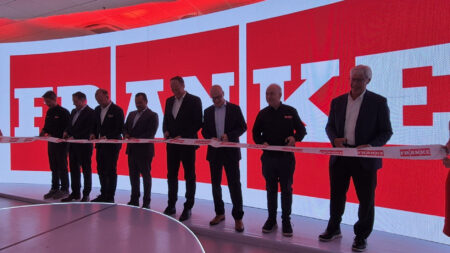
Source: Mexico Industry
Executives from both companies presented the alliance to more than 20 Chinese companies in SLP, with the support of state and municipal authorities.
Mexcentrix, a firm specializing in helping foreign companies establish industrial operations in Mexico through schemes such as shelters, contract manufacturing, and regulatory compliance services, and the law firm Mendizábal & Valdés, recognized for its personalized and specialized service to domestic and foreign companies, formalized a strategic alliance on Friday, June 20, to strengthen the services they offer their clients.
The company Mexcentrix, represented by its director Jesús Octaviano Aguirre, and the firm Mendizábal & Valdés, represented by Carlos Valdés and Diego Valdés, highlighted that this collaboration will allow them to integrate legal, tax, immigration, and labor services with a business focus, in addition to providing certainty and legal support to companies established or in the process of setting up operations in Mexico.
During the dinner, more than 20 CEOs and executives from Chinese companies with a presence in San Luis Potosí participated in the presentation of this new strategic alliance. There, representatives of Mexcentrix—with extensive experience in attracting foreign direct investment, project management, and operational consulting—shared their joint vision for facilitating the expansion of international businesses in Mexico, with an emphasis on legal, tax, and regulatory processes that are critical to successful operation.
The event was also attended by local and state authorities, including the Secretary of Economic Development for the State, Jesús Salvador González Martínez; the Director of Economic Development for the Municipality of Villa de Reyes, Gerardo Alfonso Rodríguez Baldazo; and Congressman Luis Emilio Rosas Montiel, President of the Economic and Social Development Commission of the State Congress.
All recognized the value of this private synergy as a driver for attracting and consolidating foreign investment in San Luis Potosí.
The representatives of both firms agreed that the growth of Asian companies in the region, particularly in the automotive and advanced manufacturing sectors, requires integrated professional solutions that allow them to start operations efficiently, safely, and in full compliance with Mexican regulations.
With this alliance, Mexcentrix and Mendizábal & Valdés reaffirm their commitment to the economic development of San Luis Potosí and their role as strategic allies of the foreign business community. The combination of operational experience and legal support seeks to consolidate a competitive environment for investment, strengthening the state’s position as an attractive destination for new industrial projects.


Source: El Heraldo
The automotive sector in San Luis Potosí has attracted a new international investment with the arrival of SL MEX, a Korean company that will invest US$45 million in the first phase to establish a production plant in the Logistik II industrial park in Villa de Reyes.
The announcement was made by the state governor, Ricardo Gallardo Cardona, who highlighted that the installation of SL MEX represents a firm step towards the diversification and modernization of the automotive industry in San Luis Potosí, consolidating the state as one of the main hubs for foreign investment in Mexico.
The plant, led by Kyungsoo Koo, president of SL MEX, has already been completed and has a total area of 8.9 hectares, including a building of more than 14,000 square meters. From this strategic location, automotive headlight modules will be manufactured for major global brands such as BMW, General Motors, Hyundai, and Kia.
With 12 production lines and an installed capacity to manufacture up to one million modules per year, the company will generate 385 direct jobs, strengthening regional economic development and adding value to the automotive supply chain.
According to the company’s projections, operations will begin in the coming months, and annual sales of $144 million are expected by 2030, a figure that will position San Luis Potosí as a key hub in the global supply of automotive lighting components.

Source: Mexico Now
Mexico has established itself as one of the main destinations for foreign investment in the aerospace industry. According to data from the Mexican Aerospace Industry Federation (FEMIA), the Mexican aerospace market is valued at US$11.2 billion and is projected to reach US$22.7 billion by 2029, driven by annual growth of more than 15 percent.
According to the Mexico Industry portal, at the end of the first half of 2024, 386 aerospace companies were operating in the country in 19 states, with 370 specialized plants generating more than 50,000 direct jobs and 190,000 indirect jobs. This progress has positioned Mexico as the world’s twelfth largest exporter of aerospace components.
Against this backdrop, the 2025 Mexico Aerospace Fair (FAMEX), held from April 23 to 26 at the No. 1 Military Air Base in Santa Lucía, reaffirmed the country’s strategic position in the sector. It brought together 337 companies, representatives from 48 countries, and 73 aircraft, including models such as the F-35 and the Airbus A400M.
Twenty air forces, 12 universities, and diplomats from 40 nations also participated. The fair was the scene of national innovations, such as the Pegasus PE-210A, the first aircraft designed and manufactured in Mexico by Oaxaca Aerospace. Designed for training and tactical missions, it incorporates advanced technology and can be adapted to electric or hydrogen engines, anticipating sustainable aviation.
Horizontec, a company from Celaya, Guanajuato, was also recognized with the “Made in Mexico” certificate for its Halcón 2 aircraft, assembled with high technology and in-house development. In addition, it promoted sustainability in aviation, rewarding Sustainable Aviation Fuel (SAF) projects with methods such as Alcohol-to-Jet (ATJ) and Furans to Jet (FTJ). These initiatives seek to reduce the environmental footprint and promote a clean and sustainable future.
International cooperation was key at FAMEX 2025. Foreign governments and companies explored strategic alliances. Baja California, as an aerospace hub, signed agreements with SAFRAN and Meloche Group, reinforcing its position as a center for foreign investment.
Delphine Borione, French ambassador, highlighted that her country has invested almost $280 million in the Mexican aerospace sector, positioning itself as the second largest foreign investor. She also highlighted partnerships with universities to train qualified human capital.
Florence Copin, from Safran, emphasized that this company is the leading aerospace employer in Mexico, present in four states and accounting for 25 percent of the sector’s workforce, employing nearly 15,000 people. She reaffirmed her commitment to innovation, excellence, and the professional development of Mexicans.
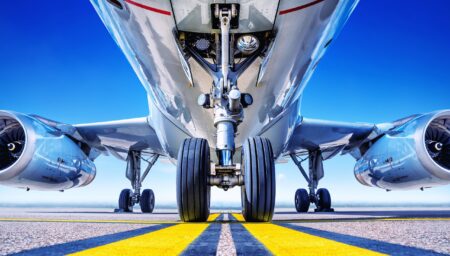
Source: Mexico Now
Following the publication of the tariff rules on Tuesday, it is now official that Mexico, Canada and the United Kingdom are the countries that, to date, have the best access conditions to the U.S. market, although the levies themselves go against the T-MEC.
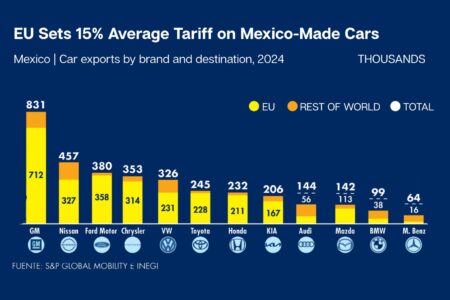
The United States reduced from 25% to 15% the approximate average tariff on imported cars originating in Mexico, informed Marcelo Ebrard, Secretary of Economy.
The lower rate is conditional on the vehicles complying with the rules of origin of the Mexico-U.S.-Canada Agreement (T-MEC). Otherwise, imports will pay a 25 percent tariff.
President Donald Trump imposed a 25 percent tariff on certain auto imports, effective April 3, 2025, and certain auto parts imports effective May 3, 2025.
For autos, the United States applies exceptions to three nations: “a discounted tariff” to Mexico and Canada, and an annual quota for the United Kingdom of 100,000 units with a 10 percent tariff.
Regarding the former, the U.S. Department of Commerce published this Tuesday in the official gazette (Federal Register) the procedures to obtain discounts in tariffs on auto imports, which only apply to Mexico and Canada if they comply with the rules of the T-MEC and can be retroactive as of April 3, 2025.
“Vehicles that are made in Mexico will have a discount from that tariff (…) by around 40%, but it may be that in some cases it will be higher,” he said during a COA conference in Mexico City.
He explained it in this other way: “From now on and from the time this new rule goes into effect, vehicles that are made in Mexico and go to the United States, instead of paying 25 percent, will pay around 15 percent.”
Trump’s Proclamation states that automobiles that qualify for preferential tariff treatment under T-MEC may submit documentation to the Department of Commerce to identify the U.S. content in each model imported into the United States.
In 2024, the United States imported approximately 8.1 million automobiles from the world with values totaling approximately $248.8 billion, based on the categories of automobiles described in Annex I of the referenced Proclamation.
Among these automobiles, approximately 3.7 million (approximately 46%) are included in U.S. trade statistics that have been declared eligible for T-MEC preference.
Within that volume, 1.07 million of these eligible cars were imported from Canada, and 2.66 million cars were imported from Mexico.
In theory, these discounts represent the upper limit of cars that could qualify for tariff exemptions on the U.S. content of these imports.
According to analysts, the United States violates the T-MEC by imposing tariffs on cars imported from Mexico or Canada that comply with the T-MEC.
“Today an agreement is published that I see as very positive, which establishes preferential treatment for the automotive industry in Mexico and Canada, in relation to the automotive industry of other countries in the world,” said Ebrard.
Then he added: “This decree, which is being published today, says that on average between 40, maybe 50% of the tariffs for automotive vehicles will be reduced, 40 to 50%, with respect to other countries in the world”.
At the event, Susan Segal, President and CEO of the Americas Society/Council of the Americas, commented: “I am convinced that the concept of an integrated North America, the T-MEC will continue, because in the end it continues to benefit all three countries.
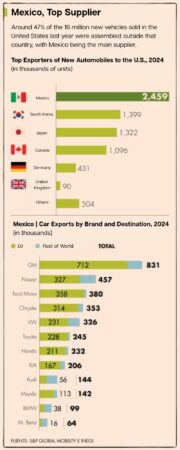
Source: El Economista
The entity reaffirms its position as an automotive hub with the inauguration of the second industrial plant of San Luis Dasung, a subsidiary of the Malaysian group MK TRON, located in the Logistik II Park.
The expansion represents an investment of US$9 million and the generation of 250 new direct jobs, bringing the company’s total workforce to 700 workers.
Dedicated to the components for the automotive industry in Mexico and the United States, San Luis Dasung strengthens its operational capacity with an industrial complex equipped with Korean automated technology.
This advanced infrastructure not only improves production efficiency, but also demands specialized technical personnel, generating well-paying jobs and raising the region’s industrial profile.
During the inaugural event, the head of the Secretariat of Economic Development (Sedeco), Jesús Salvador González Martínez, emphasized that San Luis Dasung’s investment reflects the confidence of foreign capital in the state. He also highlighted the importance of collaboration between the public and private sectors as a key to consolidate San Luis Potosí as a pole of attraction for new investments.
With this expansion, San Luis Dasung not only expands its footprint in Mexico, but also boosts regional development through skilled technical employment, technological innovation and export-oriented supply chains.
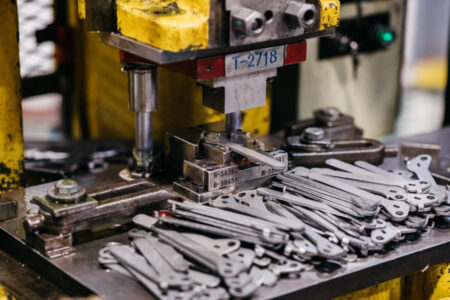
Source: Mexico Now
Unilever, one of the world’s largest consumer goods companies, has announced a multi-million dollar investment in Mexico to build a manufacturing plant in the northern state of Nuevo León.
The move follows a previous announcement in February 2023, when the company said it planned to invest US $400 million in Mexico over the next three years. This week’s announcement increases that initial sum to $800 million.
Despite the uncertainty resulting from a series of global tariffs imposed — and later paused — by U.S. President Donald Trump, the beauty and personal care products manufactured by the new facility will be destined primarily for export to the United States and Canada. The factory will be located at Nexxus and Nexxus2, within the Salinas Industrial Park in the municipality of Salinas Victoria near Monterrey, Nuevo León.
“Nuevo León continues to thrive!” Nuevo León Governor Samuel García wrote on his official X account from London, where he met with the company’s executives as part of a European working tour promoting Nuevo León as a strategic hub for new investments.
García’s state, in fact, has been on quite a run lately in attracting new investment.
Just a few days ago, during the same European working tour, García announced that toy company LEGO will invest $508 million to expand its plant in Ciénega de Flores, outside of Monterrey.
Other recent investments in Nuevo León include that of car manufacturer Volvo (US $1 billion), electric tools manufacturer Daye (US $260 million), mobility company Fixbus (US $162 million), zinc die casting products manufacturer Zinkteknik (US $60 million), industrial automation and robotics company Kuka (amount not made public yet) and global logistics service provider Rhenus (US $50 million).
“Investments like these prove that we are the industrial heart of Mexico and a global manufacturing powerhouse,” García added.
As for the Unilever project, in its first phase, the new plant is expected to create 850 direct jobs, with an additional 120 jobs possible in the future. The products manufactured in Monterrey will include deodorants, shampoos, hair conditioners and body lotions from well-known brands such as Dove and Sedal.
Once finished, the plant will seek the coveted Lighthouse certification, an international recognition for factories that use cutting-edge technologies to increase productivity and efficiency while minimizing their environmental impact.
In addition to the Nuevo León project, Unilever has made significant investments in its four existing plants in México state, Morelos and Mexico City. Between 2021 and 2023, it allocated 5.5 billion pesos (US $277 million) to increase production capacity and boost exports from Mexico to its international markets.
With over 400 brands across a wide range of industries in 190 countries worldwide, Unilever estimates that two billion people use their products every day. These brands include Magnum, Rexona, St. Ives, Hellman’s, Knorr, Ponds and TRESemmé, among many others.

Source: Mexico News Daily
Hours after his global trade sanctions package went into effect, and amid a volatile Treasury bond market, Donald Trump put the brakes on his tariff war and announced a 90-day pause for most U.S. trading partners, with the exception of China.
Trump’s decision, which took even his trade representative, Jamieson Greer, who was testifying at the time in the House of Representatives, by surprise, came amid not only a drop in the major New York Stock Exchange indexes, but an imbalance in the Treasury bond market, the most solid instruments in the U.S. financial system.
Traditionally, bond yields rise in periods of financial volatility, but on this occasion – for the first time in recorded history – yields fell, which could reflect capital flight, according to experts.
Trump’s decision raises tariffs on China to 125 percent, but maintains a reciprocal levy of 10 percent for most countries during the pause period.
The news triggered one of the steepest stock market rallies in 16 years, partially recovering the losses of the past two weeks.
In the case of Mexico and Canada, Scott Bessent, Secretary of the Treasury, sowed confusion when he agreed to reporters that the two U.S. trading partners would be taxed at 10 percent, like all other countries except China.
However, the White House clarified that they were never on the reciprocal tariff list and will continue to be subject to the 25 percent tariff on steel and aluminum, as well as 25 percent on auto exports that do not comply with T-MEC rules of origin.
Without acknowledging a failure of the strategy, President Trump told reporters that more than 75 countries have already approached the United States to try to reach some agreement.
“Now the bond market looks beautiful,” he wrote shortly thereafter on the social network Truth Social.
Countries that had already offered zero tariffs on U.S. goods include Vietnam, Argentina and Israel, among others.
His decision came amid deepening fractures in conservative ranks, especially in the U.S. Senate, which were reflected during Greer’s appearance.
A parade of foreign officials to Washington is now expected, as requested by the White House, to seek to negotiate bilateral agreements and try to clear the uncertainty in the global trade and financial system over the next 90 days.
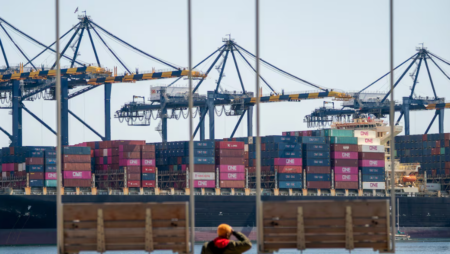
Source: El Financiero
COUNTERING TRADE PRACTICES THAT THREATEN TO IMPAIR U.S. NATIONAL SECURITY: Today, President Donald J. Trump signed a proclamation invoking Section 232 of the Trade Expansion Act of 1962 to impose a 25% tariff on imports of automobiles and certain automobile parts, addressing a critical threat to U.S. national security.
MAINTAINING A RESILIENT DOMESTIC INDUSTRIAL BASE: President Trump is taking action to end unfair trade practices that jeopardize U.S. national security.
STRENGTHENING AMERICA’S MANUFACTURING INDUSTRY: President Trump’s decision to implement tariffs on imports of automobiles and automobile parts will protect and strengthen the U.S. automotive sector.
TARIFFS WORK: Studies have repeatedly shown that tariffs can be an effective tool for reducing or eliminating threats to impair U.S. national security and achieving economic and strategic objectives.

Source: White House

